| |
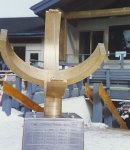 |
Collingwood |
Ontario |
Canada |
Equatorial Dial |
Dial 333 |
| The 12in (30cm) equatorial dial is made of brass with a thin wire gnomon along the polar axis. The dial is mounted on a stainless steel cube with an engraved Equation of Time correction table on the four sides of the cube. The sundial is dedicated to those age 80 an older who have skied at the Oster Bluff Ski Resort. They remind us that the days of enjoyment continue in the winter of our lives, we celebrate the wisdom and social grace they have shared with us as well as their devotion to the sport of skiing. |
| |
| |
 |
Morristown |
New Jersey |
USA |
Horizontal Dial |
Dial 332 |
| 12 in diameter horizontal dial with very elaborate engraving on the bronze dial plate. In the center is a 32 point compass rose. Hour lines are corrected for gnomon width. The Equation of Time chart is engraved inside circle of hour lines with Roman numerals, which extend 4Am-8PM. At the south end of the gnomon is engraved 'R Glynne Fecit'. This appears to be a copy of dial by Richard Glynne, an 18th century dialist. Pedestal is a concrete spiral. |
| |
| |
 |
Paramus |
New Jersey |
USA |
Horizontal Dial |
Dial 331 |
| A ground level horizontal dial constructed from a rim of ten interlocking concrete pieces each 33 inches long. The interior is filled with an irregular concrete pieces whose edges form the hour and half-hour lines. The gnomon is iron, 51 inches from base to tip of style. The gnomon interior has a bronze statuette in the shape of a griffin taken from George Washington's coat of arms. The dial was stolen and replaced in early 1980's. |
| |
| |
|
Stony Point |
New York |
USA |
Horizontal Dial |
Dial 330 |
| This bronze dial measures 22 inches in diameter, with the gnomon tip 10 inches above the marble dial plate. Hours are marked by Roman numerals, half hours by tics. Dial stis atop a stone and cement base. |
| |
| |
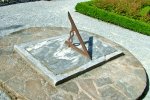 |
Kennett Square |
Pennsylvania |
USA |
Horizontal Dial |
Dial 329 |
| Dating from 1976, this "secret" garden room (once a sundial garden with boxwood parterre) was designed by Thomas Church and is on the western side of the 1908 Square Fountain pool. The ground level horizontal dial is limestone with an iron gnomon. Hour lines identified by Roman numerals; hours divided into minutes. Hour line distribution adjusted for style width. EoT engraved on PM side of dial face. Dial sits atop a large mortared stone base. |
| |
| |
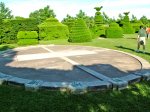 |
Kennett Square |
Pennsylvania |
USA |
Analemmatic Dial |
Dial 328 |
| 37.2 ft x 23.8 ft. This is probably the world's largest analemmatic, unusually designed to show standard time directly. It took 8 years of daily readings to perfect the sundial, which is accurate to within 2 minutes. Hour markers are bronze Roman numerals. Minute lines inscribed in limestone curbing. The gnomon itself is a moveable pole that is set on an AM or PM daily curve. NASS member P. Kenneth Seidelman was instrumental in correcting this design in 1978. |
| |
| |
 |
Baltimore |
Maryland |
USA |
Equatorial Dial |
Dial 327 |
| The dial is a partial cylinder held upright at the proper angle by four ornate pillars. The gnomon is a wire stretched between another pillar at the south edge and the mouth of an eagle mounted on another pillar at the north edge. On the wire is a bead, the shadow of which falls on the cylindrical plate. The cylindrical plate has an analemma for each daylight hour of standard time.' (McDowell) One of three known to be made in this design. Another dial of this design, once in front of the Physical Laboratory at Northwestern University, was placed at a private residence in New Hampshire in 1973, Evanston, IL. |
| |
| |
|
Baltimore |
Maryland |
USA |
Horizontal Dial |
Dial 326 |
| Very bad small dial on a beautiful stone pedestal. The engraving on the base states that it was erected in 1908. At some point the dial face went missing. A new dial was installed sometime before 1966. It is doubtful that the existing dial is a replica of the original. The stylistic differences between the design of the pedestal and the design of the new dial which sits atop it are apparent. The gnomon is now missing from the dial. |
| |
| |
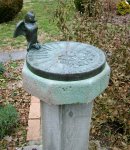 |
Baltimore |
Maryland |
USA |
Horizontal Dial |
Dial 325 |
| A 12 inch diameter horizontal bronze dial. A wire is stretched from the dial's center, which is decorated as a cluster of flowers, to the beak of a bird perched on the rim of the dial plate, forming the gnomon at proper angle. The bird is apparently the 'early bird' eating the worm (gnomon). The dial plate itself has hour lines and Roman numerals from 5 am to 7 pm. Dial sits atop a cast concrete post with octagonal top. |
| |
| |
|
Baltimore |
Maryland |
USA |
Horizontal Dial |
Dial 324 |
| A horizontal dial 36 inches in diameter, made of bronze, sitting on an irregular pentagonal block of granite. Gnomon missing. Calibrated to read local solar time, and has a graph of the Equation of Time to correct readings to standard time. |
| |
| |
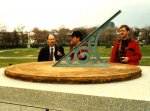 |
Baltimore |
Maryland |
USA |
Horizontal Dial |
Dial 323 |
| Nice horizontal dial sitting on a 6 x 4 ft (2x1,3m) stone pedestal. The dial itself is 5-ft (1.5m) in diameter with a 2.5-ft (0.75m) high gnomon of open-work bronze. The lines, numerals and lettering of the dial face are so finely done that one cannot tell whether the dial plate was made of cast stone or was carved by an extraordinarily skilled mason. The gnomon, unfortunately, is situated incorrectly on the dial face. The point at which the stile diverges from the dial plate is about five inches south of the correct point where the hour lines converge. |
| |
| |
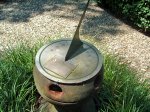 |
Rehoboth Beach |
Delaware |
USA |
Horizontal Dial |
Dial 321 |
| A bronze horizontal dial about 18 inches in diameter. The sundial was designed by Col. W.S. Corkran in 1930 and placed in the Homestead House garden, a 3 1/2 acre site maintained by the Rehoboth Art League since 1938. Col. Corkran died in 1962. The sundial was restored in 1999, set atop a capstan from an old sailing ship. Since 1999 the salt air has continued to deteriorate the plaques and gnomon. The dial face is still quite readable, with Arabic hours from 6am to 6pm delineated in 5 minute intervals. Symbols of the zodiac decorate the dial in a circular arc. |
| |
| |
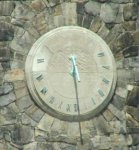 |
Wilmington |
Delaware |
USA |
Vertical Dial |
Dial 320 |
| A round limestone vertical dial about 3-ft (1m) in diameter with bronze gnomon. Hours are bronze Roman numerals. No hour lines drawn. The dial is set on the side of a beautiful stone tower. According to a plaque at the tower's base, in 1895 Theodore Leissen recommended a large pavilion and observatory be built on the city's highest hill. At the same time the Water Commission needed a water tower. The plans were merged, resulting in a combine stone water tower 115-ft (35m) tall holding half a million gallons and a roofed observatory platform. The dial is on the side of Rockford Tower. |
| |
| |
 |
Olympia |
Washington |
USA |
Horizontal Dial |
Dial 319 |
| John W. Elliot, a Seattle master craftsman designed and execute the Territorial Sundial. The 6 foot dial is hand-hammered in brass with a bronze rod gnomon. The dial plate has eight bas-relief panels depicting events in Washington State's history including the discoveries of Captain George Vancouver in 1792, the Medicine Creek Treaty between the US and Puget Sound Native Americans in 1854 and the first railroad to Puget Sound, built in 1883. The dial rests on a large slab of Wilkenson sandstone, the same material used in the nearby State Library, supported by four, one foot nine inch tall piers. |
| |
| |
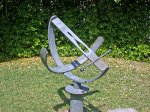 |
Galveston |
Texas |
USA |
Equatorial Dial |
Dial 318 |
| This is an equatorial dial 3 x 4 feet tall, set up for the latitude and longitude of Galveston Texas. Corrections for the Equation of Time are cut as an analemma into the broad gnomon that rotates on a polar rod. The Equatorial time ring has hour lines viewed as standard time or DST at 5 minute intervals. |
| |
| |
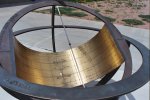 |
Sacramento Peak |
New Mexico |
USA |
Cylindrical Dial |
Dial 317 |
| The bronze cylindrical dial is 5-foot in diameter. The dial reads time and date from a rod gnomon cast onto an engraved, equatorial band. The dial shows date bands and solar time corrected for longitude (3 min 17s west of the 105 degree meridian). The dial is accurate to about one minute. At the noon hour line is an analemma showing the correction to mean time. The armillary sphere was designed and built by observatory staff members Dr. Don Neidig, Scott Gregory, and Mitchell Davis. |
| |
| |
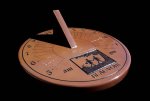 |
Washington |
District of Columbia |
USA |
Horizontal Dial |
Dial 316 |
| A horizontal dial 26 inches in diameter with a 9 inch gnomon. Has hour and half hour lines from 5 am to 7pm with 10 minute marks. Made of chocolate sandstone. South of the gnomon is an engraving of two children walking under a tree. Designed by John Carmichael |
| |
| |
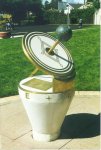 |
Seattle |
Washington |
USA |
Equatorial Dial |
Dial 315 |
| An interesting equatorial dial 30 inches in diameter, made of bronze and terrazzo, sitting upon a tapered concrete pedestal cylinder that almost, but not quite, looks like a large flower pot. The dial plate is plainly decorated with a gnomon pole about 1.5 inches in diameter. Sitting at the north end of the pole is a very nice globe of the earth with continents in relief. |
| |
| |
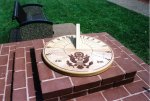 |
Park City |
Kentucky |
USA |
Horizontal Dial |
Dial 314 |
| A beautiful horizontal dial 25 inches in diameter with a 9 inch gnomon. Has hour and half hour lines from 5 am to 7pm with 10 minute marks. South of the gnomon is an intricately engraved Great Seal of The United States of America. The dial is of Coconino sandstone and sits on a brick surround. |
| |
| |
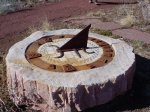 |
Flagstaff |
Arizona |
USA |
Horizontal Dial |
Dial 313 |
| This cast iron horizontal dial is set in a 6 foot diameter limestone base 2 feet off the ground. The interior region of the dial face is a white tile mosaic. The gnomon has pictures of buffalo and a horned lizard done in relief. The edge of the dial is a cast iron ring, upon which are four cardinal points and hour markers from 5am to 7pm, likewise in cast iron. The dial is corrected to mountain standard time. |
| |
| |
 |
Worcester |
Massachusetts |
USA |
Equatorial Dial |
Dial 312 |
| A Victor E. Edwards bronze equatorial sundial. It has an unusual crescent shaped arm with notch at the upper end. The arm is rotated until sunlight through the notch strikes an analemma on the lower inner curve of the crescent. Time is then read on a circular dial from an "hour hand" pointer extending from the base of the crescent. |
| |
| |
 |
Brooklyn |
Michigan |
USA |
Horizontal Dial |
Dial 311 |
| A well-rusted horizontal dial of iron or steel about 10 inches diameter on a stone and masonry pedestal. Dial face shows Arabic hour numerals but hour line angles may be wrong. Mounted atop a stone and masonry pedestal. |
| |
| |
|
Los Angeles |
California |
USA |
Sculpture/Artwork |
Dial 309 |
| A sundial sculpture by Martha Oathout Ayers. More information about this dial is needed. |
| |
| |
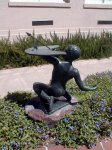 |
Oakland |
California |
USA |
Sculpture/Artwork |
Dial 307 |
| Bronze sundial sculpture by Robert Paine. The sundial was donated to University High School in 1927 by Sara Bard Field in honor of her son Albert, who was killed in 1917 in an automobile accident. Albert was the high school senior class president in 1917. His mother Sara was a leading suffragist on the West Coast. The High School has been renovated and now used by Children's Hospital Oakland Research Institute (CHORI). |
| |
| |
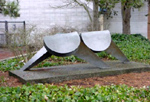 |
Seattle |
Washington |
USA |
Sculpture/Artwork |
Dial 306 |
| 3x9x4 feet cast bronze sculpture of two gibbous shaped circles, each with supports. The sculpture called "Gnomon" could have been better called "abbreviated millipede" |
| |
| |
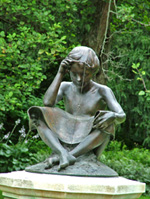 |
Indianapolis |
Indiana |
USA |
Sculpture/Artwork |
Dial 305 |
| Bronze Sundial, Boy with Spider
Gnomon wire is broken but present as of 2/2014. |
| |
| |
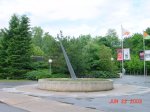 |
Saratoga Springs |
New York |
USA |
Horizontal Dial |
Dial 304 |
| A horizontal dial 43 feet in diameter, built on a raised circle flower bed raised about 3 feet above the ground. Outside the raised circle the hours are shown by roman numbers are embedded in the walkway. The metal gnomon is approximately 20 feet above ground and is centered in the raised flower bed. |
| |
| |
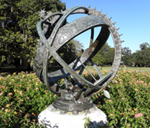 |
Murrells Inlet |
South Carolina |
USA |
Armillary Sphere |
Dial 303 |
| This bronze armillary titled "Cycle of Life"is one of several by Paul Manship in the 20's. The equatorial band has Roman hour numbers on the inside and ornate signs of the zodiac on the outside. Also on the dial are the four elements of earth, fire, water, and air. In the center are three figures of a man, woman, and child symbolizing the cycle of life. |
| |
| |
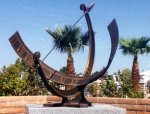 |
Mesa |
Arizona |
USA |
Equatorial Dial |
Dial 302 |
| Very handsome equatorial dial of bronze and dark marble, approximately 50 in (127cm). diameter. 6am to 6pm in Roman lettering. Gnomon in the form of an arrow. Sits on a triangular base atop a square marble top 21in (53cm) on a pedestal 39 in. (1m) high. |
| |
| |
 |
Rolla |
Missouri |
USA |
Sun Alignment |
Dial 301 |
| Stonehenge-like half-scale model. 5 trilithons. A south-facing trilithon carries a pierced brass plate which projects a spot of sunlight on a folded analemma pattern. Stone. |
| |
| |
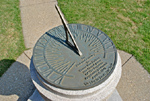 |
Concord |
New Hampshire |
USA |
Horizontal Dial |
Dial 300 |
| A 16 inch diameter cast bronze horizontal dial with 7 inch high cast and machined bronze gnomon. Dial face shows hour, half-hour and quarter-hour lines and Roman hour numerals 5 AM to 7 PM. The hour lines are corrected for longitude but no EOT correction is shown. |
| |
| |
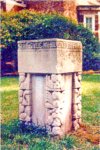 |
Evanston |
Illinois |
USA |
Horizontal Dial |
Dial 298 |
| This was once a horizontal sundial of unknown construction commissioned by the Works Progress Administration. The dial has been removed and only a 24x24 inch pedestal remains, now adorned by a flower pot. |
| |
| |
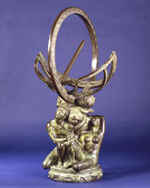 |
Washington |
District of Columbia |
USA |
Equatorial Dial |
Dial 297 |
| Bronze 36 in. sundial titled "Garden of Eden". Smithsonian notes: "In Garden of Eden Sundial, the long stick would indicate the time by casting a shadow on the numbers that line the inside of the sphere. Marie Louise Speed commissioned this depiction of the Garden of Eden to decorate private grounds surrounding her estate outside Louisville, Kentucky. In the scene, Adam and Eve grasp the fruit of knowledge that will drive them from paradise. Manship patterned Adam’s hair on the serpent’s scales to emphasize man’s fall from grace." |
| |
| |
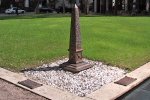 |
Orlando |
Florida |
USA |
Obelisk or Vertical Gnomon |
Dial 294 |
| Bronze, granite An obelisk which, at the noon hour, will cast a shadow on a noon mark plaque positioned on the ground. |
| |
| |
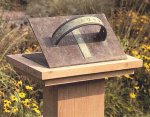 |
Redlands |
California |
USA |
Equatorial Dial |
Dial 293 |
| Equatorial dial designed by Russ Busher. A semicircle of metal, pierced with numerals. Sun shines through numerals onto metal plate with vertical line mounted below. Semicircle in equatorial plane, plate in polar plane. Such a dial is frequently advertized in "Wind and Weather" catalog. Placed atop a wooden post. |
| |
| |
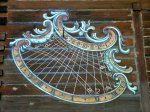 |
Kohler Village |
Wisconsin |
USA |
Vertical Dial |
Dial 290 |
| A direct east vertical dial approximately 5 feet square, ornately painted onto the side of the Waelderhaus at Kohler Village. The Waelderhaus is a tribute to the tradition of Bregenzerwald, a province of Vorarlberg, Austria, and represents the architecture of this particular Alpine Area. The dial is painted in gold and white with flourishes. A top scroll shows hours with Arabic numerals while a bottom scroll shows the hours with Roman numerals. Lines for solstice, equinox, and signs of the zodiac are drawn across the faces of the dial. No analemma is drawn. |
| |
| |
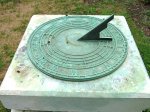 |
Urbana |
Illinois |
USA |
Horizontal Dial |
Dial 289 |
| Horizontal dial 14 inches diameter, with 5 inch tall gnomon. Sits on stone pedestal 40 x 40 x 42 inches. |
| |
| |
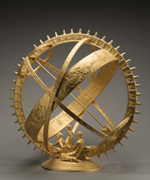 |
Jackson |
Mississippi |
USA |
Armillary Sphere |
Dial 288 |
| A 30 inch gilded bronze armillary sphere, titled "Cycle of Life". The armillary sphere is composed of rings representing the great circles of the heavens. The sundial symbolizes the cycle of life encompassed by the cycle of eternity. Figures of a man, woman and child represent the Cycle of Life. On the rings and base are depicted the elements, seasons, hours of the day and signs of the zodiac. All is held up by circle of tortises. |
| |
| |
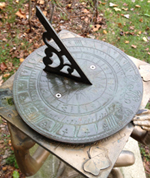 |
Grand Rapids |
Michigan |
USA |
Horizontal Dial |
Dial 287 |
| A cast iron statue of a small boy painted in gold and kneeling. With arms upright, he holds a plate on top of his head that held the original sundial face, surrounded by an inscription and ornamentation. The statue is bolted to a concrete pedestal. With the original sundial gnomon removed, a new oversized horizontal dial has been carelessly bolted onto the top plate. The gnomon and dial face imply it is a British reproduction, totally unsuited for the Michigan location. The dial face is ornate, with a compass rose in the center, surrounded by a chapter ring divided in 15 minute intervals. A second, outer chapter ring divides time into 5 minute intervals. Time is indicated with Roman numeral hour marks. Dial in good alignment, but illuminated by the sun only during early morning. |
| |
| |
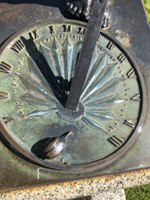 |
Denver |
Colorado |
USA |
Horizontal Dial |
Dial 286 |
| A large horizontal 6 1/2 ft. x 4 ft. dial in bronze A child figure stands, casting a shadow on the sundial. Child's hands may have held a gnomon rod, now missing. There is a traditional gnomon fixed to the dial plate. Dial and figure are placed atop a granite pedestal. |
| |
| |
|
Cleveland |
Ohio |
USA |
Armillary Sphere |
Dial 285 |
| In 2014, Cleveland Botanical Garden joined forces with The Holden Arboretum to become Holden Forests and Gardens. The dial is a 37 inch diameter armillary. Composed of four iron rings bisected by an arrow. Mounted atop an upright cylinder. Gift of Lucile Teeter Kissach. Restored 1993. |
| |
| |
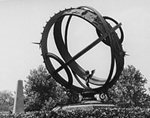 |
Washington |
District of Columbia |
United States |
Armillary Sphere |
Dial 284 |
| The original Noyes armillary sphere was donated by Bertha Noyes in honor of her sister, Edith. Made of copper and bronze, the 6-foot armillary had an equatorial band with symbols of the zodiac, a meridian circle and arctic & antarctic circles. A winged cherub — a putto — stood in the center. The dial sat upon a octagonal polished green granite base. |
| |
| |
 |
Murrells Inlet |
South Carolina |
USA |
Horizontal Dial |
Dial 283 |
| This graceful 10 foot bronze sundial is a model of Paul Manship's dial "Time and Fates of Man" made for the 1939 New York World's Fair. The 1939 dial was made of plaster and stood 80 feet tall, claiming to be the biggest sundial in the world. |
| |
| |
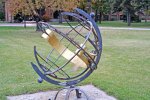 |
Grand Forks |
North Dakota |
USA |
Armillary Sphere |
Dial 282 |
| A large brass and cast iron armillary dial with full equatorial and equinoctial colure rings, two tropic rings and Arctic and Antarctic circle rings. The sphere is tilted so the gnomon rod points to celestial north pole. On the gnomon is a nodus for casting the noon day shadow on a plate with an engraved analemma. The whole armillary is mounted simply on a short four-legged stand. |
| |
| |
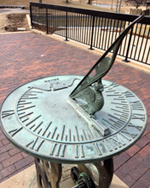 |
Wichita |
Kansas |
USA |
Horizontal Dial |
Dial 281 |
| A bronze dial about 2 feet in diameter that has a simple chapter ring with Roman numerals. The gnomon is an artistic extension of a bird. The sundial sits atop a 30-inch pedestal of open ironwork reminiscent of a clock tower. Cogs put together inside the open structure at the bottom reinforce this impression. All sits on a square concrete dais. |
| |
| |
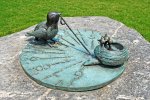 |
Boston |
Massachusetts |
USA |
Horizontal Dial |
Dial 280 |
| A small bronze horizontal dial with bronze figures of a bird with baby birds in nest and pulled worm as gnomon. The whole dial on originally set on a large granite boulder. The dial may have been moved to the roof-top garden, but a photo of the garden shows no large boulder. A possible photo (seen in a Getty commercial image) shows the dial on the ground missing the gnomon. It may not have even been orientated properly to be used as a sundial when it was moved up to the rooftop. |
| |
| |
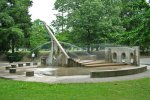 |
New Haven |
Connecticut |
USA |
Horizontal Dial |
Dial 279 |
| Large horizontal dial 17 ft. diameter with concrete gnomon 20 ft. high. Hour marks include longitude correction. Dial has a circular layout with a large sundial arm that sprays water on one side, a curved bench for sitting on the opposite side, a wading pool in between and a curved wall with three large oval holes cut out on one side. The sun shines through the wall onto the number of the sundial. |
| |
| |
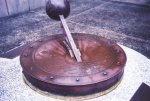 |
Honolulu |
Hawaii |
USA |
Horizontal Dial |
Dial 278 |
| The dial is a raised horizontal circle 18 inches in diameter. The nearly inch-wide brass gnomon supports a raised relief globe, with the Hawaiian Islands uppermost to accurately show which part of the world is in sunlight. The dial has hour lines and a ring of 5-minute marks. Hours are numbered from 6 until 18. Cardinal points and magnetic north are indicated. Dial shows some signs of deterioration. Designer Ginnosuke Ohara is a dialist with Japan's Research Institute for Sundials. The dial base is a mushroom design of concrete about 40 inches high and 40 inches in diameter. A time capsule is located in the base, to be opened in 2030. |
| |
| |
|
Greensboro |
North Carolina |
USA |
Equatorial Dial |
Dial 277 |
| 33 ft. Bronze Sundial consisting of two intersecting semi-spherical arcs. Gift of the Greensboro Council of Garden Clubs, 1981. Mounted atop a 12 sided granite base. |
| |
| |
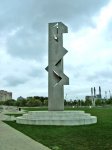 |
Indianapolis |
Indiana |
USA |
Sculpture/Artwork |
Dial 276 |
| A stainless steel and concrete vertical structure 33 feet tall called the "Totem". It has triangular and trapezoidal cut-outs, placed in the center of a concrete circle, with a sundial face but is not a functional sundial. |
| |